How Centre is bringing about positive changes in Kashmir
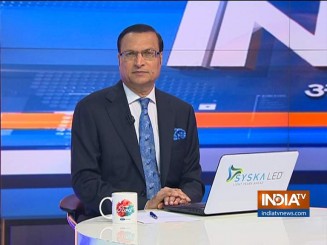 India TV in its show ‘Aaj Ki Baat’ on Tuesday night telecast two news stories from Jammu & Kashmir which will surely bring optimism in the minds of every Indian in sharp contrast with the gloomy outlook that is sought to be portrayed about Kashmir in the international media.
India TV in its show ‘Aaj Ki Baat’ on Tuesday night telecast two news stories from Jammu & Kashmir which will surely bring optimism in the minds of every Indian in sharp contrast with the gloomy outlook that is sought to be portrayed about Kashmir in the international media.
Twenty-five hi-tech smart government schools have started functioning in Srinagar. For the first time in their lives, poor children studying in government schools attended demo classes in these hi-tech schools. Regular academic session will begin from April. Every classroom had new desks and chairs for students, with brightly coloured walls and smart boards replacing the outdated black boards.
When the Centre revoked Article 370 in J&K on August 5 last year, students’ education was the first to be hit due to indefinite lock down in the Valley. Later, schools reopened, but parents were afraid of sending their wards to schools fearing reprisals from separatists. Examinations were conducted on time with nearly 100 per cent attendance, but kids studying in primary and middle classes were badly hit.
The structural transformation in government schools has brought smiles to the faces of students and their parents. Before Article 370 was revoked, annual fee charged from every student in a government school was Rs 250, inclusive of books and uniform. Now that J&K is a union territory, the students will not have to pay a single paisa.
The deputy CEO of Srinagar smart city project told India TV that the transformation was brought about with a budget of Rs 5 crore only. The Development Commissioner of Srinagar described these new look schools as a New Year gift for poor students.
Apart from modernizing school education, the new UT administration has started putting in place mass recruitment drive in different categories. to start with, the Central Reserve Police Force has started a recruitment drive for inducting 1,300 women constables and officers, for which nearly 21,000 women applied.
In severe cold, hundreds of women aspirants flocked to recruitment camps in Rajouri, Doda, Kishtwar and other places. The recruitment drive is going on at full pace in Ramban, Kishtwar, Udhampur, Reasi, Jammu and Kathua, where tests for physical endurance and fitness are being carried out. J&K police officials told India TV that recruitment drive for young men will begin soon on a massive scale.
To sum up: the average Kashmiri wants peace to prevail in the Valley after three decades of insurgency. Every Kashmiri wants his or her children to get the best education and job opportunities. These aspirations also reveal one important fact: that in the last 70 years, not much was done in the fields of education and jobs.
Now that the work has begun, the Centre is sending 36 ministers to meet cross sections of society in a massive reachout programme. Union Minority Affairs Minister Mukhtar Abbas Naqvi was in Srinagar, where common people told him that almost no development has been made in the last several years and most of the promises made by the government have not been fulfilled.
The outspokenness of common Kashmiris airing their grievances may be embarrassing for officials, but I prefer to look at this from a different angle.
Common Kashmiris airing their grievances before a Union Minister is a sure signal of change. At last, the common man is speaking out without any semblance of fear. People in Kashmir have high aspirations from the Centre, and there is nothing wrong if the common man reminds a minister about past promises. Now is the time for the Centre to fulfill these promises in areas where much remains to be done.
Click Here to Watch Full Video| Get connected on Twitter, Instagram & Facebook
Nadda will have to face critical challenges as the new BJP chief
 On Monday, 59-year-old Jagat Prakash Nadda took over the reins of Bharatiya Janata Party as its new president replacing Home Minister Amit Shah, who was the party chief for five and a half years.
On Monday, 59-year-old Jagat Prakash Nadda took over the reins of Bharatiya Janata Party as its new president replacing Home Minister Amit Shah, who was the party chief for five and a half years.
Prime Minister Narendra Modi along with party veterans L. K. Advani and Dr Murli Manohar Joshi attended the event. Modi recounted how he used to ride pillion on Nadda’s scooter while working together in Himachal Pradesh to build up the party organisation.
Nadda’s elevation was a foregone conclusion six months ago when he was appointed working president. The event that took place on Monday was a mere formality. When Nadda was chosen party chief, he may not have imagined the extent to which the Modi government may need the support of the party organisation, by the time he took over.
At the event, Prime Minister Modi blamed the opposition for spreading confusion in the minds of people, though he did not refer to CAA and NRC specifically. Modi said that instead of the government machinery, party workers need to go to the people to dispel all misgivings and explain the correct position.
The challenge before Nadda is a huge one. Under his leadership, the party has to win the Delhi and Bihar assembly elections this year. Steering India’s biggest political party at such a critical juncture is surely a challenging task. Nadda is a leader who prefers to keep a low profile but he knows the nitty gritty of his party organisation very well.
The plus point that goes in his favour is that he had worked for many years closely with Modi, when the latter was given charge of Himachal Pradesh. Modi knows Nadda’s organisational capability and personally he has full trust in him. This will be Nadda’s greatest strength in the months to come.
Click Here to Watch Full Video| Get connected on Twitter, Instagram & Facebook
Take stringent action against those who brainwash children to spout venom against government
 India TV in its prime time show ‘Aaj Ki Baat’ on Friday night telecast three videos of Muslims children (faces blurred to conceal identity) at Shaheen Bagh, Delhi, in which they were openly making provocative remarks against Citizenship Amendment Act and Prime Minister Narendra Modi. It appears that these kids were either brainwashed or taught to parrot provocative sentences.
India TV in its prime time show ‘Aaj Ki Baat’ on Friday night telecast three videos of Muslims children (faces blurred to conceal identity) at Shaheen Bagh, Delhi, in which they were openly making provocative remarks against Citizenship Amendment Act and Prime Minister Narendra Modi. It appears that these kids were either brainwashed or taught to parrot provocative sentences.
In the videos, we noticed when some of the kids failed to give replies, they turned back to ask adults sitting behind them.These adults were seen prompting the kids to say what they wanted to be told on camera. Clearly, some individuals with vested interests are exploiting children in order to incite emotions for political ends.
Normally when such incidents happen, those in the media, in courts and in legislatures issue appeal not to exploit children for political agenda. Children, by nature, have a clean slate in their minds and hearts, and it is inhuman to instil hatred in their minds and brainwash them to follow a patently wrong direction. Legally, stringent action is taken whenever anybody exploits, harasses, beats or abuses children or make them perform forced labour.
I consider exploitation of children in order to incite communal feelings towards political ends must be treated as a big crime. Adults and elderly persons have the right to sit on peaceful protests and air their views against the policies of the government. But exploiting children to incite communal feelings is not only injustice, but also an act of cruelty towards them.
It is the first and foremost duty of parents to prevent interested groups from exploiting their kids, and if they fail, action must be taken against people who are behind such nefarious acts.
Click Here to Watch Full Video| Get connected on Twitter, Instagram & Facebook
Why India decided to invite Imran Khan to SCO summit
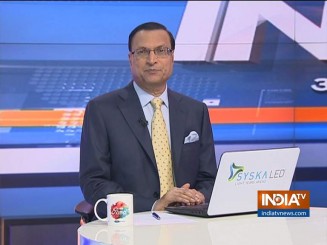 India on Thursday announced it would send invitation to Pakistan Prime Minister Imran Khan to attend the summit of Shanghai Cooperation Organisation (SCO) scheduled for October this year. SCO is a regional economic and security bloc to which India and Pakistan were admitted in 2017. India will be hosting the SCO summit for the first time.
India on Thursday announced it would send invitation to Pakistan Prime Minister Imran Khan to attend the summit of Shanghai Cooperation Organisation (SCO) scheduled for October this year. SCO is a regional economic and security bloc to which India and Pakistan were admitted in 2017. India will be hosting the SCO summit for the first time.
“As per established practice and procedure of SCO, all the eight members, as well as four observer states, and other international dialogue partners will be invited”, said the spokesperson of Ministry of External Affairs.
For the MEA spokesperson, it was naturally difficult to predict whether the invitation will be accepted by the Pakistan PM. This invitation should neither be linked to the current bilateral relations between India and Pakistan nor should this be considered as India’s invitation to Imran Khan to come on an official visit to India.
Since Pakistan is a member of SCO, India, as host country, was bound to invite him. However, I feel that there are dim hopes of Imran Khan attending the summit. In the past, heads of government had sent their Foreign Ministers to this summit.
Since the SCO summit is almost a year away, nobody can predict what will happen ten months from now, even if Imran Khan decides to visit India.
Click Here to Watch Full Video| Get connected on Twitter, Instagram & Facebook
Rescue visuals that should make every Indian proud of our army
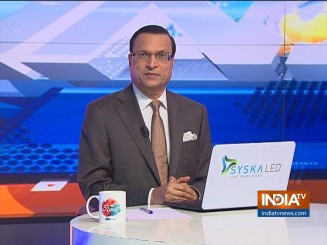 India TV on Wednesday night in its ‘Aaj Ki Baat’ show telecast visuals of how our brave army jawans rescued two men and a pregnant woman trapped in snow in Baramulla, Kashmir.
India TV on Wednesday night in its ‘Aaj Ki Baat’ show telecast visuals of how our brave army jawans rescued two men and a pregnant woman trapped in snow in Baramulla, Kashmir.
The most stunning visuals were those of our jawans walking 4-5 kilometres through knee-deep snow, carrying a pregnant Kashmiri woman, Shamima, on a stretcher, to the nearest base camp, even as other jawans were busy clearing snow for the ambulance to take her from the base camp to a hospital. Shamima gave birth to a child and both of them are fine.
There has been continuous snowfall in Kashmir valley since January 12. Roads were closed due to heavy snowfall. Indian army got information that Shamima, a resident of Dardpora village in Baramulla was expecting early delivery of her child. Her husband made a distress call to the army, and within minutes, jawans and doctors of the local patrolling army unit reached their home. The doctor advised early hospitalization.
Jawans immediately carried the woman on the stretcher and walked through snow to take her to the base camp. At the same time, Rashtriya Rifles jawans cleared snow from the helipad, in case the patient needed air transport. The army however decided to take Shamima by road to Baramulla hospital, and another detachment of jawans started clearing snow for the ambulance. The woman reached the hospital in time and safely delivered the child.
Prime Minister Narendra Modi retweeted the army’s Chinar Corps video on Shamima’s rescue, and wrote “our Army is known for its valour and professionalism. It is also respected for its humanitarian spirit. Whenever people have needed help, our Army has risen to the occasion and done everything possible. Proud of our Army. I pray for the good health of Shamima and her child.”
In Lachhipora village of Baramulla, on Wednesday, two men, Tariq Iqbal and Zahoor Ahmed Khan, while going towards Bijhama were trapped in a landslide. The guard commander at an army base camp, nearly 200 metres away, swung into action. Quick Response Team was called in, and within minutes, Zahoor Ahmed Khan, who was half-buried in snow, was rescued. There was no trace of his friend Tariq.
After hectic clearing of snow in a 100 metre radius, he was found 20 minutes later, fully buried in snow. His body had turned cold, but he was still breathing. Army jawans immediately dug up the snow, and Tariq was rushed to hospital, where he is alive and fighting for survival.
Such visuals make the chest of every Indian swell with pride. The met department has predicted continuous heavy snowfall in the valley for the next 3-4 days. The army is out rescuing people trapped in bad weather right up to Ladakh, where army choppers were used to rescue six trekkers near Zanskar river adjoining Leh on Tuesday. This rescue operation was done in minus 50 degree Celsius weather.
Every Indian should know that our brave jawans and officers not only eliminate terrorists and infiltrators to keep our borders safe, but also work as angels to rescue people in distress. We should be proud of our army and applaud our jawans and officers whenever we see them in public places.
Click Here to Watch Full Video| Get connected on Twitter, Instagram & Facebook
Congress must avoid giving communal colour to terror cases
 The leader of Congress in Lok Sabha, Adhir Ranjan Chowdhury on Tuesday tried to add communal colour to the recent arrest of a Jammu and Kashmir DSP Davinder Singh, who was caught with a Hizbul terrorist and an overground worker. Chowdhury said, “Had Davinder Singh by default had been Davinder Khan, the reaction of troll regiment of RSS would have been more strident and vociferous. Enemies of our country ought to be condemned, irrespective of colour, creed, and religion.”
The leader of Congress in Lok Sabha, Adhir Ranjan Chowdhury on Tuesday tried to add communal colour to the recent arrest of a Jammu and Kashmir DSP Davinder Singh, who was caught with a Hizbul terrorist and an overground worker. Chowdhury said, “Had Davinder Singh by default had been Davinder Khan, the reaction of troll regiment of RSS would have been more strident and vociferous. Enemies of our country ought to be condemned, irrespective of colour, creed, and religion.”
Congress spokesperson Randeep Surjewala tried to add a conspiracy angle by asking whether Davinder SIngh “was only a pawn in a bigger conspiracy”. Davinder Singh was the DSP in Pulwama when the infamous suicide attack took place in February last year killing 40 CRPF jawans. Surjewala also quoted 2001 Parliament attack convict Afzal Guru’s remark that he had cut a deal with Davinder Singh, who was then in Special Operation Group.
Surjewala asked, “Who is Davinder Singh? What was his role in Parliament attack? What was his role in Pulwama attack? Was he carrying Hizbul terrorists on his own, or was he only a pawn, as master conspirators are elsewhere?”
The arrested DSP has reportedly confessed that he was helping terrorists as he wanted money for his daughter’s marriage. Looking at his under construction house in Kashmir, one can easily conclude that he was no ordinary policeman. Now that the National Investigation Agency has taken up the probe, one should expect that more facts would emerge.
I feel that the entire matter is not so simple as is being projected. NIA will have to dig out more replies to questions that are being raised. Can a DSP level officer be so naive as to keep terrorists in his house, keep telephonic contacts and then take them in a car towards Delhi? Any one would find these difficult to believe.
As far as giving a communal colour to the arrest, and raising suspicions about Pulwama attack are concerned, the reactions from Congress leaders seem amateurish. Already, the Congress had to bite the dust during Lok Sabha elections for questioning Pulwama attack. If the party leaders raise this question again, they would be committing another mistake. Raising suspicions and giving communal touch to terror cases for scoring political brownie points cannot be in the national interest.
The problem is that the Congress party has a number of leaders who excel in the art of making atrocious statements. They include Mani Shankar Aiyar, who recently made pro-Pakistan remarks in Lahore at a literary fest. Such statements do not behove the leaders of the Grand Old Party of India.
Click Here to Watch Full Video| Get connected on Twitter, Instagram & Facebook
Thousands travel in overcrowded trains in Bihar to appear for exam
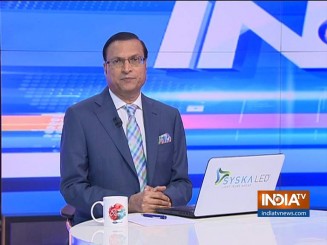 On Sunday (January 12), thousands of aspirants for the Bihar Police constable entrance exams flocked to railway stations, forced their way into reserved compartments of trains and travelled on rooftops to reach their examination centres. Near Hajipur , they stoned the Delhi-bound Guwahati Rajdhani Express and blocked rail and road traffic, alleging that there were no trains to travel to Bettiah and Motihari, where the exam centres were located.
On Sunday (January 12), thousands of aspirants for the Bihar Police constable entrance exams flocked to railway stations, forced their way into reserved compartments of trains and travelled on rooftops to reach their examination centres. Near Hajipur , they stoned the Delhi-bound Guwahati Rajdhani Express and blocked rail and road traffic, alleging that there were no trains to travel to Bettiah and Motihari, where the exam centres were located.
India TV in its programme ‘Aaj Ki Baat’ showed videos of students clinging on to the engines and doors of overcrowded coaches. Hundreds of them were sitting on rooftops. Railway officials who arrived at the scene with police force tried to unload the aspirants who were clinging to the engine of the train. Hundreds of exam aspirants were stranded on railway platforms as there were no trains available.
In the last one year, Railway Minister Piyush Goyal has done a lot to improve the working of Indian Railways. He had promised a day ago that the railways would run high speed trains on most of the routes and passenger amenities would be improved. Goyal may have to do some rethink after seeing these visuals of overcrowded trains in Bihar. He would definitely understand the scale and scope of his Herculean task.
There is no denying the fact that there has been overall improvement in train services and maintenance of railway stations. Wi-fi facilities have been provided at nearly 100 stations and anti-collision devices have been installed in several trains to avoid disasters. Trains are, more of less, running on time and the number of general coaches has been increased.
In spite of all these steps, if candidates travel by clinging to engines and doors of coaches, the system needs to be held accountable. The dates for Bihar Police constable entrance exams were common knowledge and Bihar police could have informed the railways in advance so that the railways could have arranged special trains for the candidates. But this was not done and the result is there for all of us to see.
Click Here to Watch Full Video| Get connected on Twitter, Instagram & Facebook
JNU violence by masked goons was a result of political group rivalry
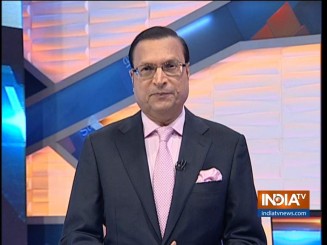 A special investigation team of Delhi Police on Friday disclosed names of nine student activists, who they alleged had indulged in violence in the JNU campus. These included the JNU students union president Aishe Ghosh. Of them, seven are from Left groups and the remaining two are from Akhil Bharatiya Vidyarthi Parishad.
A special investigation team of Delhi Police on Friday disclosed names of nine student activists, who they alleged had indulged in violence in the JNU campus. These included the JNU students union president Aishe Ghosh. Of them, seven are from Left groups and the remaining two are from Akhil Bharatiya Vidyarthi Parishad.
Looking at the videos and sequence of events, it is amply clear that this was not merely a fight between student activists but was an outcome of political group rivalry. To sum up, Left student groups had started an agitation against hike in hostel fees and later it took the shape of political rivalry.
The Left student activists, who had launched the agitation in October, did not want regular classes to be resumed in the campus at any cost, because their agitation would have fizzled out. The JNU administration initiated registration for winter session last month. Despite resistance from Left activists, more than 3,000 students enrolled for registration. ABVP activists were persuading most of the students to enrol for registration so that the Left student movement could be weakened.
The tension began when Left activists stopped pro-ABVP students from taking part in registration process. They bashed up some of the students and broke the university server thus disrupting the entire process. This was followed by attack from masked students and this attack was repulsed from the other side. To sum up, hooliganism took place from both sides and masked goons were brought in by both camps. The main issue was not about hike in hostel fees, but the question of political dominance.
Now that the SIT inquiry by Delhi Police is on, we hope more persons involved in violence would be identified. However the moot question remains: why do such incidents of violence take place in JNU alone? There are more than 900 universities in India, but why do we hear slogans like ‘Bharat tere tukde hongey’ and ‘azadi’ in JNU alone? Who are those people who retain supremacy in JNU? Time to ponder.
Click Here to Watch Full Video | Get connected on Twitter, Instagram & Facebook
Why Mehbooba expelled 8 party leaders as 15 foreign envoys visited Srinagar
 There were two major developments in Kashmir valley on Thursday. Fifteen foreign envoys, including US ambassador to India Kenneth Juster, visited Srinagar and met with politicians, army officers and members of civil society to discuss the present situation in the Valley, and former chief minister Mehbooba Mufti expelled eight party leaders for ‘engaging with the government.
There were two major developments in Kashmir valley on Thursday. Fifteen foreign envoys, including US ambassador to India Kenneth Juster, visited Srinagar and met with politicians, army officers and members of civil society to discuss the present situation in the Valley, and former chief minister Mehbooba Mufti expelled eight party leaders for ‘engaging with the government.
It was the first official trip by diplomats to Kashmir after the historic August 5 repeal of Jammu and Kashmir’s special status and bifurcation of the the state into two union territories. Politicians in the Valley who met the diplomats included former minister Syed Altaf Bukhari and Majid Padder (both PDP), and Shoaib Lone and Hilal Shah (both Congress).
In the evening, former chief minister Mehbooba Mufti, though under house arrest, announced through her Twitter handle that she has expelled eight party leaders for what she called ‘engaging with the government’.
The eight leaders are Dilawar Mir, Rafi Ahmed Mir, Zaffar Iqbal, Abdul Majeed Padrroo, Raja Manzoor Khan, Javaid Hussain Baig, Qamar Hussain and Abdul Rahim Rather. These were the leaders who had met the Lt. Governor G. C. Murmu on Tuesday.
However, a senior PDP leader former deputy chief minister Muzaffar Hussain Baig hit out at Mehbooba saying it was her ‘provocative’ remark that ‘no one would be left to hold the tricolour in the Valley, if Article 370 was removed’ that led to the bifurcation of Jammu & Kashmir. Baig said, ‘the statement should not have been made. If J&K has to live together and if we have to bat for our rights, we have to talk with decency and humility’.
Baig also said, ”we cannot get anything by browbeating and threatening Modiji, Home Minister or NSA. As citizens of India, we should put before them our grievances and our problems with humility’.
It is a fact that there has been no bloodshed in the Valley after Article 370 was revoked and not a single citizen died at the hands of security forces. I would rather say the citizens in the Valley played a greater role than the security forces in maintaining peace. Nothing of the sort like ‘rivers of blood will flow’ happened after revocation of Article 370 as leaders like Dr. Farooq Abdullah, Omar Abdullah and Mehbooba Mufti had warned ominously.
The people of the valley have given their reply to Mehbooba Mufti. Five months have elapsed since the revocation of Article 370, cellphone and SMS services have been resumed, leaders are being released from detention in phases.
It would be better if the Centre decides to resume internet services in the Valley. Internet services are an essential part of daily life. Students need internet to study, traders need internet for trade, and tourists find it difficult to book hotel rooms in the absence of internet. The government has to bear the burden of fall in revenue because of loss of trade. Resumption of internet services in the Valley is the need of the hour.
Click Here to Watch Full Video| Get connected on Twitter, Instagram & Facebook
Why Trump wants escalation of tension with Iran
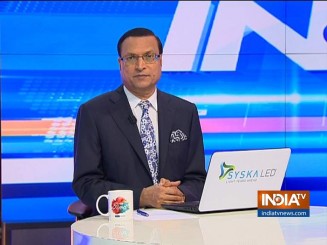 Iran on Wednesday fired 22 ballistic missiles at two American bases inside Iraq causing structural damage, but there were no reports of casualties. Hours later a Ukrainian airliner carrying 176 people crashed soon after take off from Tehran airport killing everyone on board. It is unclear what caused this disaster as there were contradictory statements from different sources.
Iran on Wednesday fired 22 ballistic missiles at two American bases inside Iraq causing structural damage, but there were no reports of casualties. Hours later a Ukrainian airliner carrying 176 people crashed soon after take off from Tehran airport killing everyone on board. It is unclear what caused this disaster as there were contradictory statements from different sources.
Most of the airlines have suspended their flights over Iranian airspace and crude prices are spiralling. While Iran’s supreme leader Ayatollah Khamenei described the missile attacks as “a slap” on the US, the American President Donald Trump in a televised speech on Wednesday night claimed that “Iran appears to be standing down”. Trump however vowed that as long as he was President, he would never allow Iran to acquire a nuclear weapon.
In our show “Aaj Ki Baat” on Wednesday night, we had shown a video clip, in which Trump had said in 2011 that the then US President Barack Obama “in order to get re-elected will start a war with Iran”. Now, the boot is on the other foot.
Watching the video, one can easily understand why Trump ordered the assassination of Iran’s Maj. Gen. Qasim Suleimani. I remember, in 1998, the then US President Bill Clinton was facing impeachment charges in the US Congress and he had then ordered the army to attack Iraq. The demand for impeachment was soon overshadowed by news of attack on Iraq.
Similarly, in 2012, when Obama was preparing for re-election, it was Trump who alleged that Obama may attack Iran in order to win the re-election. Now that Trump may face impeachment charges, one does not need rocket science to understand why the US President initiated escalation of tension with Iran.
Click Here to Watch Full Video| Get connected on Twitter, Instagram & Facebook
Justice for Nirbhaya alone will not do, the entire system needs to be changed
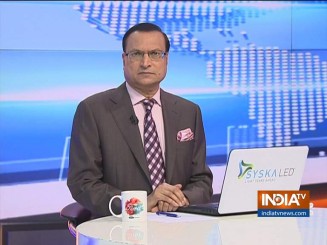 After a long wait of more than seven years, the death warrants to execute all four convicts in the infamous 2012 Nirbhaya gangrape murder case were issued by a Delhi court on Tuesday. The four rapist-killers will be hanged till death on January 22 at 7 am inside Tihar jail. .
After a long wait of more than seven years, the death warrants to execute all four convicts in the infamous 2012 Nirbhaya gangrape murder case were issued by a Delhi court on Tuesday. The four rapist-killers will be hanged till death on January 22 at 7 am inside Tihar jail. .
Additional Sessions Judge Satish Kumar Arora, in his order, wrote, “…when reasonable time and opportunity has been afforded to them, there is nothing to delay passing of orders on the application seeking issuance of death warrants”.
The four convicts have still two weeks’ time to file curative petition in Supreme Court or send mercy plea to the President.
Nirbhaya case is a perfect example of how it is difficult to mete out swift punishment to perpetrators of gruesome acts. All the four convicts had committed the heinous crime, all the facts were established beyond doubt, right from the lower court to the apex court, and yet the delay.
Details of this gruesome crime are such that could unnerve even the hardened criminals. There were witnesses and evidences. There was tremendous pressure for justice from all sections of society. Delhi police, on its part, did not make any delay in investigation, and yet it took seven years for the death warrants to be signed.
Questions now do arise in our minds what may be happening to the rape victims and their families, who faced similar gruesome crimes, but their cases did not get wide publicity. These families have no support from the general public nor any big lawyers to fight their cases. They have been making rounds of the courts for many years. When will they get justice?
Justice for Nirbhaya alone will not do. The entire criminal jurisprudence system will have to be modified in a manner so that the families of victims will not have to wait long, while convicts take undue advantage of the system and spend time at leisure inside jails.
Of course, the execution of four convicts in Nirbhaya case will surely send a strong message and strike fear in the minds of criminals, but it is also a fact that ‘justice delayed is justice denied’. Nirbhaya’s parents got justice after making rounds of courts for seven years. You would be surprised to know that there are nearly 2,000 similar cases of gangrape languishing in law courts for more than 10 years.
According to National Crime Records Bureau, 67 convicts were given death sentence in heinous rape cases during the last two years, but not a single convict has been hanged.
It would be wrong to blame the court alone. The fault lies in the entire criminal jurisprudence system. Posts of judges are lying vacant right from lower to higher courts, there is lack of infrastructure for courts, and for a country of 1.3 billion people, we have only seven forensic labs.
Blaming the judiciary alone won’t do. We have to bring swift changes for the better in the entire system. It is only then that thousands of innocent victims like Nirbhaya will get justice at the earliest and rapists will have to think twice before they commit such heinous acts.
Click Here to Watch Full Video| Get connected on Twitter, Instagram & Facebook
Rampage by goons in JNU has brought a bad name to India
 A group of goons, armed with iron rods, went on a rampage on Sunday night inside the Jawaharlal Nehru University campus and attacked and terrorized students in their hostels for about half an hour. During the three hours of terror, the students, most of them female, locked themselves up inside their hostels. The goons hit and wounded several students and ransacked the campus. They later slipped away in full gaze of Delhi police, which was awaiting permission from the JNU administration to enter the campus.
A group of goons, armed with iron rods, went on a rampage on Sunday night inside the Jawaharlal Nehru University campus and attacked and terrorized students in their hostels for about half an hour. During the three hours of terror, the students, most of them female, locked themselves up inside their hostels. The goons hit and wounded several students and ransacked the campus. They later slipped away in full gaze of Delhi police, which was awaiting permission from the JNU administration to enter the campus.
Images of bleeding students and broken glasspanes have caused nationwide outrage, and on Monday, the Left and the BJP leaders blamed each other for the attack. Leftists allege that the attackers belonged to Akhil Bharatiya Vidyarthi Parishad (ABVP), student wing of RSS, and ABVP leaders allege that the masked goons were brought in by the Left to terrorize the students.
I fail to understand what one would gain by terrorizing students. The main question that arises is: how the goons made their entry, who called them in , and whether they were JNU students or not. Delhi Police claims to have identified some of the goons but is unwilling to reveal their identities now. Police have taken away all CCTV footage from the campus and are investigating all videos and several WhatsApp conversations that took place during that time.
I can only say, whatever happened in JNU on Sunday night has brought a bad name to India. People across the world are viewing videos of how the goons went on the rampage. These goons and their collaborators inside JNU have left a black spot on the image of Indian universities, and it will take years to wipe them off.
The issue is not going to end easily. There were protests on Monday by students in Mumbai, Kolkata, Pune, Assam, Hyderabad, AMU, Agra, Dehradun, Chandigarh, Chennai, Bhopal, Ahmedabad, Bengaluru, Puducherry and even abroad in London, Oxford, Sussex, Columbia University and Nepal.
I have no hesitation in saying that Congress and Left parties are behind most of the protests that took place in India. These two political parties have quite a large base in these universities. For the last several weeks, these parties used to stage student protests in Jamia Millia Islamia and AMU on the issue of CAA and NRC, and now, after this rampage in JNU, they have got another issue in their hands.
One thing to note: when Delhi Police entered Jamia after stone pelting by protesters last month, these parties questioned how police entered the campus without permission, and now that goons went on rampage inside JNU, they are now questioning why police stood silently and helped the masked goons escape. There is a popular song from a Hindi movie: “yeh public hai sab jaanti hai” (the common people know everything). After watching all these, I feel sad over how we are wasting our time and energy over non-issues.
Click Here to Watch Full Video| Get connected on Twitter, Instagram & Facebook